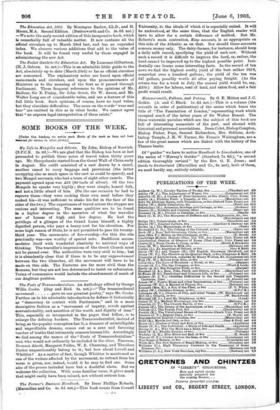movement gave us our greatest poetry," says Mr. Cooke. Further
on in his admirable introduction he defines it historically as "democracy in contact with Puritanism," and in a more descriptive fashion as a "movement of inquiry, revolt against conventionality, and assertion of the worth and dignity of man." This, especially as interpreted in the pages that follow, is to enlarge the defining borders. The Transcendentalist, instead of being, as the popular conception has it, a dreamer of unintelligible and unprofitable dreams, comes out as a sane and farseeing teacher of truths that intimately concern human life. Accordingly we find among the names of the " Poets of Transcendentalism" men who would not ordinarily be included in the class. Emerson, Bronson Alcott, Margaret Fuller, W. E. Channing, and Theodore Parker unquestionably belong to it; but how about Lowell and Whittier? As a matter of fact, though Whittier is mentioned as one of the writers affected by the movement, no extract from his verse is given, nor, indeed, would it be easy to find one. Some also of the poems included have but a doubtful claim. But we welcome the collection. With some familiar verse, it gives much that might easily have been missed, not without serious loss.










































 Previous page
Previous page